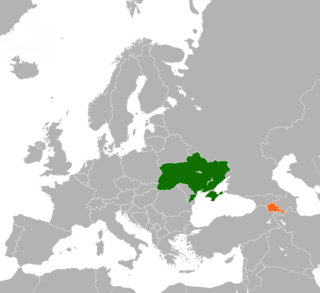
Since its independence, Armenia has maintained a policy of trying to have positive and friendly relations with Iran, Russia, and the West, including the United States and the European Union. It has full membership status in a number of international organizations, such as the Council of Europe and the Eurasian Economic Union, and observer status, etc. in some others. However, the dispute over the Armenian genocide of 1915 and the ongoing Nagorno-Karabakh conflict have created tense relations with two of its immediate neighbors, Azerbaijan and Turkey.

Armenian Secret Army for the Liberation of Armenia (ASALA) was a militant organization active between 1975 and the 1990s whose stated goal was "to compel the Turkish Government to acknowledge publicly its responsibility for the Armenian genocide in 1915, pay reparations, and cede territory for an Armenian homeland." ASALA itself and other sources described it as a guerilla and armed organization. Some sources, including the United States Department of State, as well as the Ministry of Foreign Affairs of Azerbaijan listed it as a terrorist organization.

Lyal S. Sunga is a well-known specialist on international human rights law, international humanitarian law and international criminal law.

Switzerland is not a member state of the European Union (EU). It is associated with the Union through a series of bilateral treaties in which Switzerland has adopted various provisions of European Union law in order to participate in the Union's single market, without joining as a member state. Among Switzerland's neighbouring countries, all but one are EU member states.

Diplomatic relations between Armenia and Turkey are officially non-existent and have historically been hostile. Whilst Turkey recognised Armenia shortly after the latter proclaimed independence in September 1991, the two countries have failed to establish diplomatic relations. In 1993, Turkey reacted to the war in Nagorno-Karabakh by closing its border with Armenia out of support for Azerbaijan.

Armenian genocide recognition is the formal acceptance of the fact that the Ottoman Empire's systematic massacres and forced deportation of Armenians from 1915 to 1923, both during and after the First World War, constituted genocide.

Ukrainian–Armenian relations are bilateral diplomatic relations between Ukraine and Armenia, which were established on 25 December 1991. Until then, both were member republics of the Soviet Union. Today, the countries are both members of the World Trade Organization, Organization for Security and Co-operation in Europe, the United Nations, and the Eastern Partnership initiative of the EU. Currently, Ukraine has the 5th largest Armenian community in the world. The Embassy of Armenia in Kyiv opened in 1993. The Embassy of Ukraine in Yerevan opened in 1996. The current Ambassador of Armenia to Ukraine is Vladimir Karapetyan. The current Ambassador of Ukraine to Armenia is Ivan Khukhta.

Diplomatic relations between Switzerland and the United States were established in 1853 by the U.S. and in 1868 by Switzerland. The first diplomatic representation of the U.S. was established in Basel in 1853.
Events from the year 2007 in Armenia

The following outline is provided as an overview of and topical guide to Armenia:

Denmark–Turkey relations are the current and historical relations between Denmark and Turkey. Denmark has an embassy in Ankara, and Turkey has an embassy in Copenhagen. Both countries are members of NATO and OSCE and COE. Diplomatic relations between Denmark and Turkey were put under pressure in 2014 because of the Jyllands-Posten Muhammad cartoons controversy and the Roj TV affair (Roj TV's broadcasting license was suspended by the Supreme Court in Denmark on February 27, 2014). Denmark is a member of the EU, Turkey is EU candidate.

Foreign relations exist between Armenia and Bulgaria. Both countries are full members of the Organization of the Black Sea Economic Cooperation and the Council of Europe. Both nations maintain embassies in their respective capitals.

Foreign relations exist between Armenia and Portugal. Neither country has a resident ambassador. Armenia is represented in Portugal through its embassy in Rome (Italy). Portugal is represented in Armenia through its embassy in Moscow. In addition Portugal is represented in Armenia through its honorary consulate on Nalbandyan street in Yerevan. The consul is Mr. Samuel Samuelyan.

Canada and Turkey have maintained diplomatic relations since 1943. Both countries are members of the G20, NATO, Organization for Economic Co-operation and Development, Organization for Security and Co-operation in Europe, United Nations and the World Trade Organization.

Zohrab Hrachiki Mnatsakanyan is an Armenian diplomat. Mnatsakanyan previously served as Minister of Foreign Affairs and Armenia's Permanent Representative to the United Nations.

The political status of Nagorno-Karabakh remained unresolved from its declaration of independence on 10 December 1991 to its September 2023 collapse. During Soviet times, it had been an ethnic Armenian autonomous oblast of the Azerbaijan Soviet Socialist Republic. Following the dissolution of the Soviet Union, a conflict arose between local Armenians who sought to have Nagorno-Karabakh join Armenia and local Azerbaijanis who opposed this.

Norway–Switzerland relations are foreign relations between Norway and Switzerland. Norway has an embassy in Bern and Switzerland has an embassy in Oslo. Both countries are members of the European Free Trade Association, Council of Europe and the Organization for Security and Co-operation in Europe.

Bilateral relations exist between Italy and Armenia. Italy has an embassy in Yerevan and Armenia has an embassy in Rome. Both countries are full members of the Council of Europe and the OSCE.

The Ambassador Permanent Representative of Spain to the United Nations is an official of the Government of Spain belonging to the diplomatic corps representing Spain before the United Nations (UN) based in New York City, United States. This permanent representation, unlike the Permanent Representation of Spain to the European Union, does not have its own legislation and is regulated by the general regulations governing diplomatic missions, by international law and by the internal law of the UN.




















